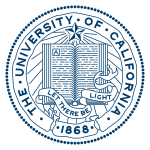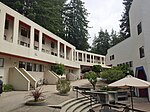University of California, Santa Cruz

The University of California, Santa Cruz (UC Santa Cruz or UCSC) is a public land-grant research university in Santa Cruz, California. It is one of the ten campuses in the University of California system. Located on Monterey Bay, on the edge of the coastal community of Santa Cruz, the campus lies on 2,001 acres (810 ha) of rolling, forested hills overlooking the Pacific Ocean. As of Fall 2022, its ten residential colleges enroll some 17,500 undergraduate and 2,000 graduate students.Founded in 1965, UC Santa Cruz began with the intention to showcase progressive, cross-disciplinary undergraduate education, innovative teaching methods and contemporary architecture. The residential college system consists of ten small colleges that were established as a variation of the Oxbridge collegiate university system.Among the faculty are Nobel Prize laureates, Breakthrough Prize in Life Sciences recipients, 12 members of the National Academy of Sciences, 28 members of the American Academy of Arts and Sciences, and 40 members of the American Association for the Advancement of Science. Nine UC Santa Cruz alumni are Pulitzer Prize winners, with a total of 11 Pulitzers awarded. UC Santa Cruz is classified among "R1: Doctoral Universities – Very high research activity". The university is also a member of the Association of American Universities.
Excerpt from the Wikipedia article University of California, Santa Cruz (License: CC BY-SA 3.0, Authors, Images).University of California, Santa Cruz
Bay Drive, Santa Cruz Westside
Geographical coordinates (GPS) Address Website External links Nearby Places Show on map
Geographical coordinates (GPS)
| Latitude | Longitude |
|---|---|
| N 37 ° | E -122.06 ° |
Address
University of California, Santa Cruz
Bay Drive
95064 Santa Cruz, Westside
California, United States
Open on Google Maps










